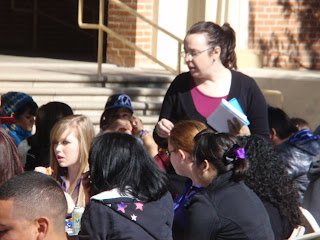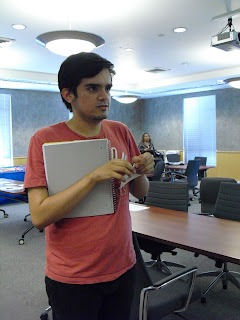On October 27, 2011 the Phoenix College Alumni Association, Career Services along with the STEM (Science, Technology, Engineering, Math) title V program conducted the Phoenix College STEM Alumni Career Forum held at the Career Services. Twenty-eight students attended the forum to hear the inspirational stories of four guest speakers who spoke on the importance of mentoring and the benefits of networking. Among the guest speakers we had: John Corella the President and CEO of Corella Companies a wholly owned minority company, Alejandro Reynoso founder and owner of AR utility Specialist, Inc, known as ARUSI, Brandy Wells the Educational and Outreach Specialist at the Translational Genomics Research Institute known as TGen, and Maria Herrera-Bill who is a full-time residential faculty member in the Mathematics Department at Phoenix College and has previously worked as an engineer for Motorola.
John Corella
John Corella is the President and CEO of the Corella Companies, which is a wholly owned minority company. He started his first company, Corella Electric, in 1976 after having worked for local electrical engineering companies. With a $250 investment, his company grew to revenues exceeding $100 million. In 1992, Corella founded Corella Electric Wire and Cable which was selected to enter into a $100 million strategic manufacturing alliance with AT&T, which eventually expanded to $300 million. In 1999, Corella Companies purchased Valor Communications which is a publicly traded company.
Maria Herrera-Bill
Maria Herrera-Bill has been a full-time residential faculty member in the Mathematics Department at Phoenix College for five years. She has many years of experience in the private sector in the engineering field having previously worked for Motorola. She is a much sought after mentor for minority students in engineering in the NSF STEM Scholarship Program and she is passionate about student engagement and success. She primarily teaches developmental courses where she emphasizes students’ personal experience as the key to gain mathematical mastery.
Alejandro Reynoso
Alejandro Reynoso is the founder and owner of AR Utility Specialists, Inc, otherwise known as ARUSI. He currently serves as the company’s President and CEO. He formed ARUSI in 1987 and has guided its involvement to a multi-disciplined engineering, design, and construction management company with over 40 employees and annual sales approaching $7 million. ARUSI specializes in engineering design for the energy and telecommunication industry and provides niche design-build project services for government and private sectors.
Brandy Wells
Brandy Wells is the education and outreach specialist at the Translational Genomics Research Institute, otherwise known as TGen, which is a non-profit genomics research institute established in 2002. TGen seeks to employ genetic discoveries to improve disease outcomes by developing smarter diagnostics and targeted therapeutics. The Institute conducts research on a number of human disorders including Alzheimer’s, Autism, Parkinson’s, Diabetes and numerous forms of cancer and a variety of other complex human diseases. The objective of TGen's Education and Outreach Division is to increase the community’s working knowledge of genomics, and to educate, train, and inspire the next generation of researchers and physicians.

John Corella’s passion is to build and when he was in the Marine Corps he was a Combat Engineer where he build and destroyed. When and he was out of the Marine Corps he decided he wanted to be an Arquitect, but when he saw that he had to compete against his talented classmates he decided he wanted to do something else, which was electrical engineering. When John Corella mentioned competing against his talented classmates it made me remember my senior Capstone Project where we were all competing to design a construction project. Competing against classmates was intimidating, but you have to persevere. John made another switch from being an Electrical Engineer to a Corporate Officer and now sees the importance of the business aspects. He recommends that those who are in the science fields to also take business classes to get the business perspective. I agree with John as many of the engineers go for the MBA (Masters in Business Administration) and it opens management positions.
Alejandro described how he went about choosing his major when a science teacher took him for a field trip to the West Phoenix Power Plant in eighth grade and he was fascinated with the mechanical aspect and how electricity was generated. From that experience he determined he wanted to be something related to power and that is how he discovered engineering.
Maria Herrera-Bill also studied engineering. As she said she started on a rough path as she soon discovered that going to school and working was not helping her. She decided to then focus on her education and complete as much as she could every semester. Therefore, she even took up to eighteen credits per semester and completed her degree in two years. After she completed her bachelors she went to work for Motorola and then decided to teach. She enjoys teaching as it is very rewarding.
Brandy mentioned that the rates of individuals executing STEM careers are a little bit lower then they need to be. However, as students’ increase their interest in STEM fields these rates may change. It is our responsibility to spread the message to others so as the world changes and becomes more scientific. An educated workforce will aid in making everyone understand the benefits of a scientific outlook.
Each of the guest speakers provide their point of view of a mentor and shared their experiences in finding a mentor. To some their supervisors were their mentors as it was someone they admired and who could provide guidance. As Brandy stated find someone in the higher ranks you can approach and who can provide a grounding foundation for what is next. A mentor can be anyone you respect and look up to through whom you can learn a lot. Alejandro brought another aspect of mentoring, “mentor each other” and through mentoring each other you can provide tips as to what you can do. He also mentioned, volunteering in your field, offer your services to others as you would never know where this may lead.
The students were very attentive capturing all the great suggestions the guest speakers were offering and the moderator kept the flow of the conversation going. The feedbacks provided by the students from the surveys were positive, enjoyed the guest speakers’ recommendations and left with an understanding of mentoring.
























































